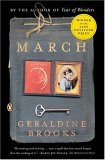Summary | Excerpt | Reading Guide | Reviews | Readalikes | Genres & Themes | Author Bio

I have it now: a rough circle of blue cloth, a scant six inches across. Perhaps the sum total of the mortal remains of Silas Stone, wood turner and scholar, twenty years old, who grew up by the Blackstone River and yet never learned to swim. I resolved to send it to his mother. He was her only son.
I wonder where he lies. Wedged under a rock, with a thousand small mouths already sucking on his spongy flesh. Or floating still, on and down, on and down, to wider, calmer reaches of the river. I see them gathering: the drowned, the shot. Their hands float out to touch each other, fingertip to fingertip. In a day, two days, they will glide on, a funeral flotilla, past the unfinished white dome rising out of its scaffolds on a muddy hill in Washington. Will the citizens recognize them, the brave fallen, and uncover in a gesture of respect? Or will they turn away, disgusted by the bloated mass of human rot?
I should go now and find out where upon this island they are tending to the wounded. Naturally, the surgeon has not seen fit to send me word. The surgeon is a Calvinist, and a grim man, impatient with unlabeled brands of inchoate faith. In his view, a man should be a master of his craft, so that a smith should know his forge, a farmer his plow, and a chaplain his creed. He has made plain his disregard for me and my ministry. The first time I preached to the company, he observed that in his view a sermon that did not dwell on damnation was scant service to men daily facing death, and that if he wanted to hear a love poem he would apply to his wife.
I dragged a hand through my hair, which has dried out in tangled mats, like discarded corn silks at a husking. Even to raise my arm for that slight effort is a misery. Every muscle aches. My aunt was right, perhaps, in her bitter denunciation of my coming here: the cusp of a man's fortieth year is no season for such an enterprise as this. And yet what manner of man would I be, who has had so much to say in the contest of words, if now I shirked this contest of blood? So I will stand here with those who stand in arms, as long as my legs can support me. But, as a private from Millbury observed to me today,
"Virginia is a hard road, reckon"
I stowed the lap desk in my rucksack. We had left the main part of our gear here on the island, but my blanket was sodden from the use of it to dry myself and to blot my soaking clothes. Still, there is some warmth in wool, wet or no. I carried it to a youth who lay, curled and keening, on the riverbank. The boy was dripping wet and shivering. I expected he would be on fire with fever by morning.
"Will you not come up the bank with me to some drier ground?" I asked. He made no reply, so I tucked the blanket around him where he lay. We will both sleep cold tonight. And yet not, I think, as cold as Silas Stone.
I made my way a few rods through the mud and then, where the bank dipped a little, scrambled with some difficulty into a mown field. In the flicker of firelight I discerned a small band of walking wounded sitting listless in the hollows of a haystack where they would shiver out the night. I inquired from them where the hospital tents had been established.
"There ainít no tents: they're using some old secesh house," said a private, nursing a bandaged arm.
"Strange place it is, with big white statues all nekked, and rooms filled up with old books. There's an old secesh lives there, cracked as a clay pot dropped on rock, seemingly, with just one slave doing for him. She's helping our surgeon, if you'd credit it. She probed out my wound for me and bound it up fine, like you see," he said, proudly raising his sling, then wincing as he did so.
"She tol' me they was more than a dozen slaves on the place before, and she the only one ain't ran off."
I don't think the private knew his left from right, for his directions to the house were less than coherent, and his friend, whose neck was bandaged and who couldn't speak, kept waving his hands in objection at every turn the other man described. So I blundered on in the dark, finding myself at the riverbank again, uncertain whether the farther shore was Maryland or Virginia. I turned back and found a line of snake-rail fence that led past the ruins of what must have once been a gristmill. I continued following the fence line until it turned in at a gate. Beyond stretched a drive lined with dogwoods, and a gravel of river stone that was hard on my bootless feet.
Copyright © 2006 Penguin Group. All right reserved.
Your guide toexceptional books
BookBrowse seeks out and recommends the best in contemporary fiction and nonfiction—books that not only engage and entertain but also deepen our understanding of ourselves and the world around us.